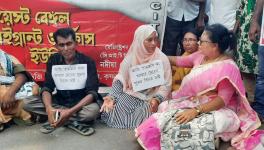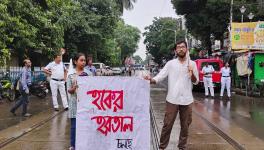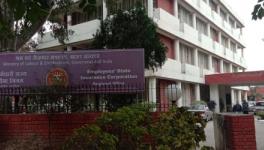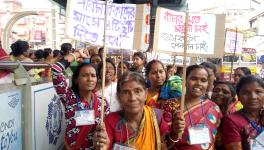FCRA Denial to Missionaries of Charity Holds Lessons on Federalism
Representational use only.
On Christmas day, news broke that the Union Home Ministry had not renewed the registration of the Missionaries of Charity (MoC) under the FCRA or Foreign Contribution Regulation Act. Many others were denied FCRA renewal, but in the case of MoC, the ministry cited “adverse inputs” about the organisation founded by Nobel laureate Mother Teresa as the reason for denial. However, very little other information was forthcoming. Days later, the Chief Minister of Odisha Naveen Patnaik offered MoC units, which help the needy and destitute, support from the Chief Minister’s Relief Fund. On 30 December, he tweeted that no resident of an MoC-run centre would suffer from a lack of food or healthcare.
As the news of this offer spread across the country, Prof Balveer Arora, who taught at the Centre for Political Studies in JNU, wrote (on Facebook) on 31 December, “Federalism came to the rescue of [the] Missionaries of Charity. Odisha CM shows the way; will others follow his example if the measures are taken by Odisha CM in opening the CM’s relief fund for MOS be followed by PM CaresFund?” Prof Mridula Mukherjee, who taught history at JNU, also said, “This should be front-page news. The Centre’s action putting the Missionaries of Charity in a disadvantageous position would be remedied to some extent by Patnaik’s support to the units of MoS working in the State of Odisha. Other CMs should follow his example. Federalism to the rescue of the nation!”
Five days later, on 4th January 2022, based on the requests of Collectors he sanctioned Rs 78.76 lakh from the CMRF to support 900 inmates of 13 institutions, including leprosarium and orphanages, run by Missionaries of Charity in 8 districts of Odisha.
It is rare for distinguished academics to comment on the decisions of individual politicians. However, the context of federalism seems to have made it imperative for them to speak out. After all, a decision taken at the highest level of the Indian federal structure is rarely reversed at the state level. Further, there have been repeated instances where the states have contended with an overarching Centre intruding into its domain. However, in the latest episode, a state has offered to undo the damage that the highest level of the federal structure is doing. Indeed, Prof Arora has a nuanced understanding of this issue, for he is also an expert on federalism and heads the Centre for Multilevel Federalism of the Institute of Social Sciences. As he made apparent in his comment, federalism in India goes beyond the constitutional and legal framework. It is also a way to understand the deeper roots of our democracy.
India has what we understand as a multilayered federalism, which includes a series of checks and balances across social and constitutional structures. Their goal, working in combination, is to uphold the idea of India and ensure governance in which the Centre cannot overrule the power of the state units. At the same time, the federal structure is meant to preserve and protect the well-being of all citizens. While this is the ideal, at present, we find that the higher echelons of the federal system often imperil governance at the grass-roots. Today, Hindutva forces are also threatening India’s federal structure.
The developments after the Centre withdrew the FCRA approval for the MoC are interesting because when a decision taken at the central level generated disapproval in other layers of governance, a lower level has responded with remedial measures. Even West Bengal Chief Minister Mamata Banerjee had expressed shock and anguish over the 22,000 patients and employees of the MoS, who would be forced to fend for themselves once the Centre cut off its funding. The lack of food and medicine would put the lives of those sheltered by the MoC at risk. It is a situation akin to denial of resources to states during the Covid-19 pandemic and the pile-up of funds due to states on the GST account. Except this time, the FCRA clearance has been denied to a body associated with Christianity and applies across the nation.
In Odisha, the District Collectors have been asked to use the Chief Minister’s Relief Fund funds wherever needed to support the work done by the MoC. This situation is important to understand, for it underlines the significance of district authorities in the federal structure. In critical times, it is this local architecture that is meant to come to the aid of people. Thirdly, the MoC units at the grass-roots, and their beneficiaries in the lowest rung of society, also represent the socio-economic deprivations that persist across India. For long, Indians have assumed that the intervention of both civil society and state are required to quell the miseries of the disadvantaged. Yet, when the Centre cancelled the FCRA registration of the MoC, it did not offer an alternate vision for the upkeep of these centres or the people housed in them.
Such neglect by the state is one reason why organisations such as the MoC, fired by compassion for the needy, have become essential to alleviate the suffering caused by poverty and lack of health services. These bodies attempt to tackle some of the deficiencies that halt India’s human development indices. They also promise the poor some dignity, while the State ignores the constitutional imperatives of social and economic justice that it is bound to provide.
It should not surprise us that the message from Patnaik attracted attention nationally: its significance lies in the fact that people expect the authorities who occupy constitutional posts to take care of their basic needs and demands. That is why Prof Arora’s statement also amplifies the need for all Indian states to assert their constitutional position and duties.
Finally, the development in Odisha is an innovative solution to the illiberal trends in Indian democracy. Even as more and more Indians are in economic distress, the country is turning towards majoritarianism, sectarianism, and bigotry instead of ameliorative measures. These kinds of contradictions are fuelling even more neglect of its essential duties by the State. India has been downgraded to a “partially free” country. It has been dubbed an “electoral autocracy”. In such times, the offer from Patnaik would naturally inspire confidence and hope.
Mahatma Gandhi had said that he would fight the mighty British empire on the strength of silent millions. He, too, represented a multilayered approach to governance that is India’s unique feature. Gandhi wished to anchor public policies to the needs of the lowermost rung of society—that is what he called Swaraj and in 1947, after India attained independence, he hoped that Swaraj would be transformed to Su Raj, and the leaders at the Centre now wish to turn this into Su-raj, or good governance. Now, in the 75th anniversary of independence, Indians need to demand creative solutions to the whittling down of federalism—real good governance, not just promises of it. Hopefully, even those who swear by “Sabka Saath, Sabka Vikas, Sabka Vishwas” would draw lessons from this episode and act to serve people regardless of faith, language, ethnicity or where they come from.
The author was Officer on Special Duty and Press Secretary to President of India KR Narayanan. The views are personal.
Get the latest reports & analysis with people's perspective on Protests, movements & deep analytical videos, discussions of the current affairs in your Telegram app. Subscribe to NewsClick's Telegram channel & get Real-Time updates on stories, as they get published on our website.
























